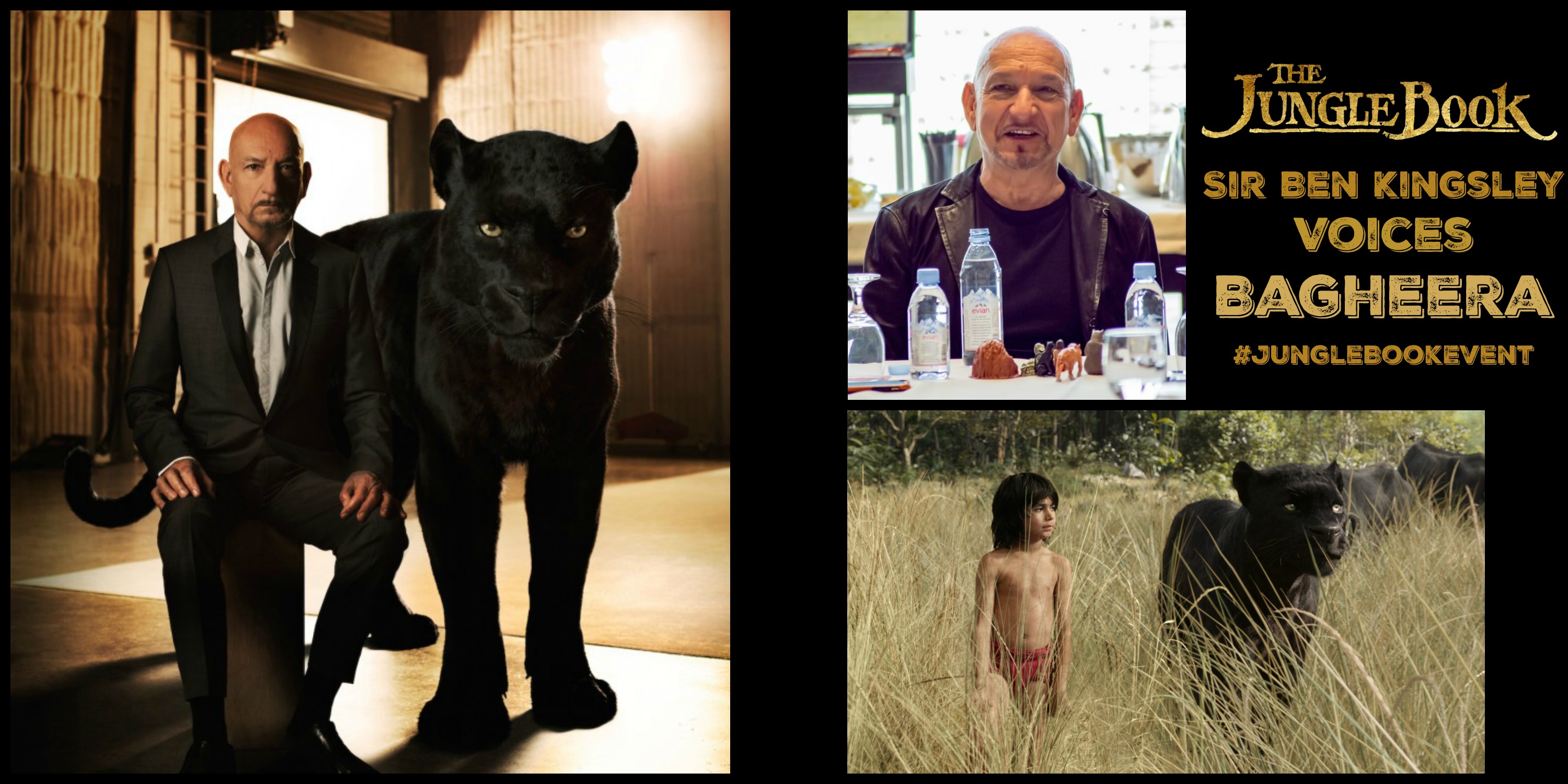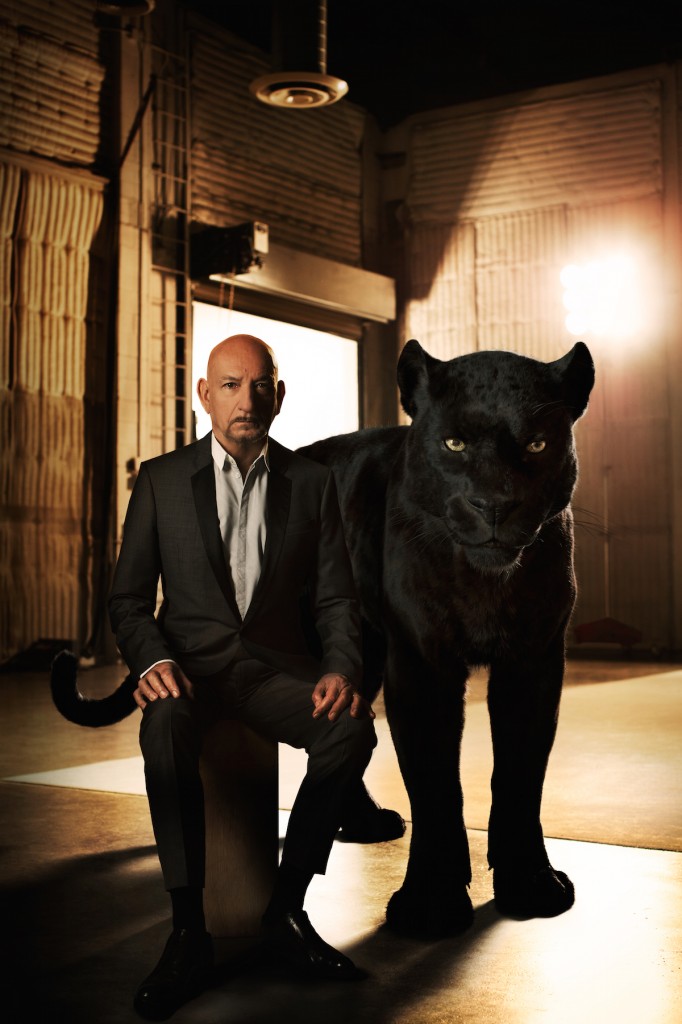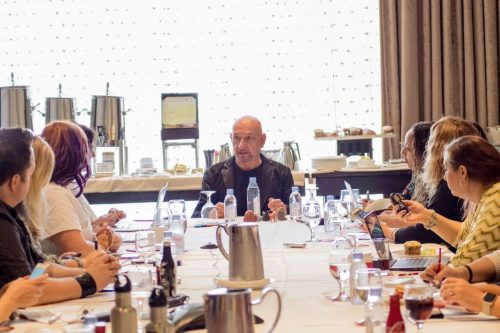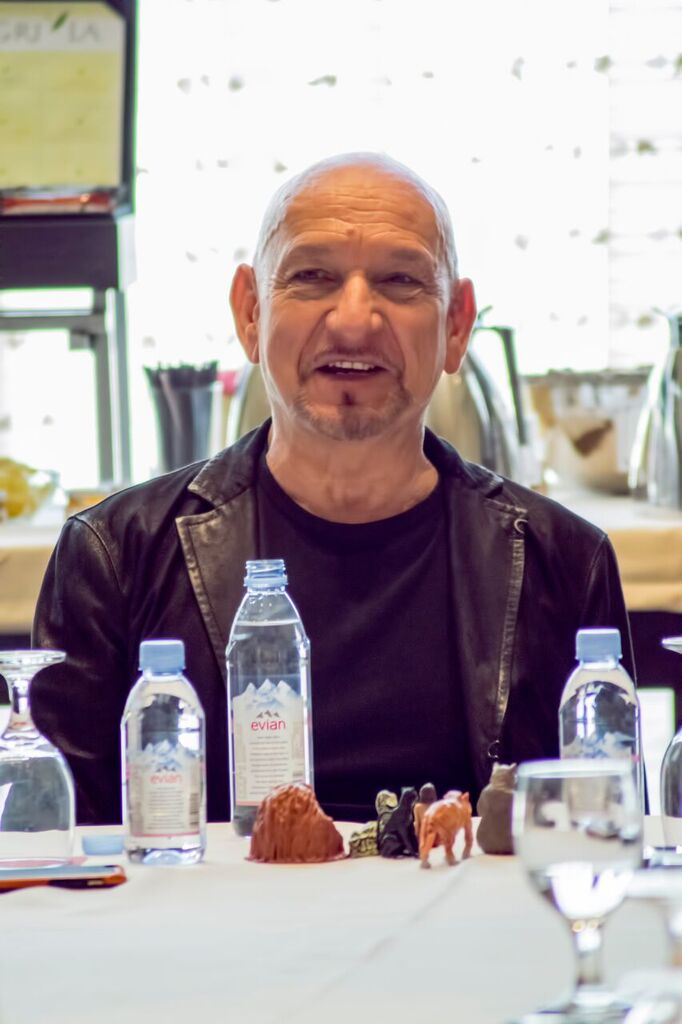
Sir Ben Kinsley is known for his villainous characters. In Disney’s The Jungle Book, Kinsley plays Bagheera, the guardian of Mowgli, just like the character in the original film. He is known for his award-winning role as Gandhi and is not new to doing voice acting. Sir Ben made quite the presence as he walked into the room, prepared to take on the blogger questions.

Sir Ben Kingsley Voices Bagheera in The Jungle Book
At the time of the interview, Sir Kingsley hadn’t had the seen the film, only some clips, so I told him he will be very happy with the outcome. It’s amazing.

Good. I think it’s very close to what, Rudyard Kipling envisioned, which was an enormous leap in his imagination, which was a child literally living with and talking with animals. And I think from what I’ve seen that’s what you experience on the screen here. With all respect to its predecessor in the ’60’s, that was an animated cartoon talking to animated cartoons, but this is a little boy, and we are blessed with him, Neel, he’s amazing, literally, well, not literally but what you see is he’s with animals, which is wonderful.
How do you prepare to play different roles and what did you do in particular to prepare to play Bagheera?
I think it varies, because either I’m propelled towards a character through recognition or through curiosity. Sometimes if neither of those factors are there, well, curiosity has to be there, because if I’m not curious about him, then, of course, that won’t be contagious and the audience won’t be curious. I started my third job as a stage actor was with the Royal Shakespeare Company, and he still is the maestro of storytelling and of putting patterns of human behavior on the stage, and on the screen, whichever. I think that if I can feel that there’s a genuine pattern of recognizable human behavior, even a little bit with animals, but that human element, which is healing, which provides an explanation, comfort, entertainment, all of the above, then I’d love to be part of it. If I feel that it’s just an invention, an obstruction, that it doesn’t have anything to do with us, then it doesn’t really excite me at all. It has to have that human ingredient to it, that moves us forward even a tiny bit as a tribe or species, whatever.
Because of the way Kipling wrote the book, having deconstructed it as part of the colonial literature of India, the characters, and their speech was very much Indian. Did the actors or did you, in this contemporary production, have to navigate the Indian-ness, or did you just treat it as a childhood classic?
When I first discussed it with John Favereau, I recognized that Bagheera was military, in the Indian Army certainly then, and then in post-colonial times, probably less now, there were British and Indian officers serving in the Indian Army. I’ve recently played a Sikh in Learning To Drive, and I’m fascinated by Indian military combination. So I offered an Indian accent as Bagheera, to play him as an Indian colonel or general, probably a colonel, and he felt that it didn’t fit the universality of the appeal of the story. So I think he made a very good choice in making it more universal, more accessible. Having said that, there’s still the ghost of the Indian colonel in my performance. It’s not any action, but it’s in his, I think it’s in his tough but very affectionate love. I think it’s there, but I did actually embark on an Indian accent and I saw Jon Favereau’s face slowly fall.
Did you see Bagheera as more of a father figure to him than Akela?
I didn’t see him as a father figure at all. I did see him in military terms, that it was as if I was training a young cadet into how to survive in particular circumstances. And I liked John’s version of this which is close to Kipling’s, which is prepare a book and a story that prepares a young person for life. And you have to prepare young people for life by lovingly introducing them to the fact that there is light and shade, that both exist side-by-side in life, and that if you dilute, distort, sugar coat, sentimentalize everything in the hope that you’re gonna keep a child’s attention, you won’t. You get the child’s attention, he’ll immediately go dark. Whenever I read stories to my children, they would always ask me to read the scary bits over and over again, even if I do, the cover would come. They would love it, because they were hearing it in a safe place. That’s the ingredient. If they are introduced to that dark side of life in a really safe environment by their parents, then it’s fun.
In the original Jungle Book, Bagheera seems a little more irritated with Mowgli than caring about him. I feel like in the new movie, he cares more about him, even as he’s introducing him to his dark spaces. So you use your experiences as a parent in that, or was that written?

I’m sure it’s inevitable to use one’s experiences as a parent, but I think in Kipling’s time, which was colonial Britain, and I think actually Victoria might still have been on the throne when he wrote the novel, which is extraordinary, you did discipline your children through irritation and lack of empathy and impatience, rather than love and encouragement. So I think, that if we want to translate it into the 21st Century, then yes, there is irritation in Bagheera, and there are those limits that he won’t let the boy transcend, but that it’s done with more empathy and more affections rather than from the book of rules. So there is a shift, yeah.
Which character do you personally relate to the most? Is it Bagheera or a little more free spirited Baloo?
I think I’m both. I think we’re all both. I think that, that when you read a great novel or see a film like this, you realize that they all represent different aspects of you. As these animals all represent different challenges to the central challenge of the young boy, which is adolescence and adulthood, massive challenges. I think that all the characters, we’ll find that they’re all part of us rather than any one individual character, that we change according to the people in front of us, to dads and moms and that’s how we approach them.
Which is tougher for you, onscreen acting or voice? And does voice bring particular challenges to you, because you’re such an amazing actor, bringing so much emotion and life into the character when you can only do it through your voices?
If I go back to Shakespeare and the density of that text, and how you have to give every word its appropriate weight and emphasis. In a great speech, I play Hamlet, for example, so that I do enjoy and find it empowering and important, urgent, to express things vocally. It’s part of my DNA.It’s part of my training, but then to surrender one’s whole physical side to an animating genius who is thousands of miles away and maybe there’s 12 of them working on Baghera’s body, you know, that’s very exciting and allows me or makes it very imperative that I explain to them through my voice, so that they can hear what I’m doing and they can animate to my voice. It’s all very exciting. Storytelling for me is, is the essential thing, so, ah, if I’m telling a story with my voice or my voice and my body or my voice, my body and an action, and then in a costume and then all sorts of things added on, the essential is the story telling.
Could you tell us a little bit about the recording process and how long it took to complete?
It was spread out over at least a year. As we developed it with Jon into the story, he was able to show us more and more what our physical shape would be on screen. I did have two days with the boy, which was great, so we were able to establish that dynamic between us. And then keep that as part of it, let that inform our performance even when we were separated by geographies. You really cannot embark on a massive project like this unless you’re director has amazing taste and judgment. Jon has both and therefore, given that he has the intelligence to see the bigger picture always in his head, he was a wonderful guide as to tone and pitch in the film. So it was really a wonderful experience.
Follow The Jungle Book on Social Media
The Jungle Book in theaters now!
Facebook | Twitter | Instagram | G+ | Pinterest | Tumblr | YouTube | Website
*I was invited by Disney to cover the press junket for The Jungle Book. All opinions are my own.
- You Have to Remember – 9/11, 20 Years Later - September 11, 2021
- Creating the Perfect Look with a Maxi Dress - October 20, 2020
- Brand Better Giveaway - October 6, 2020


Leave a Reply